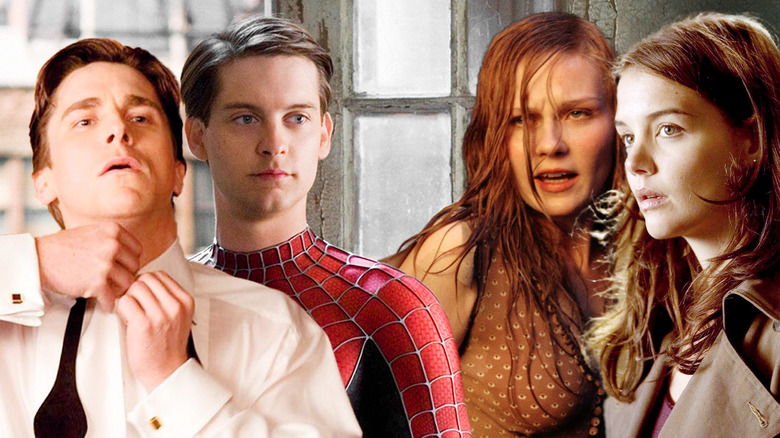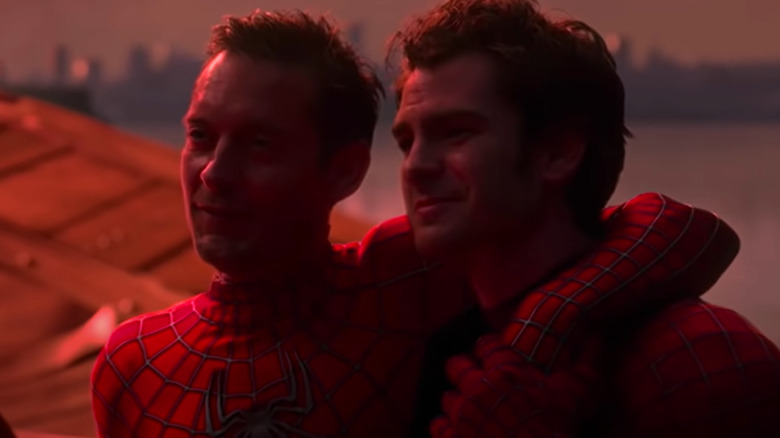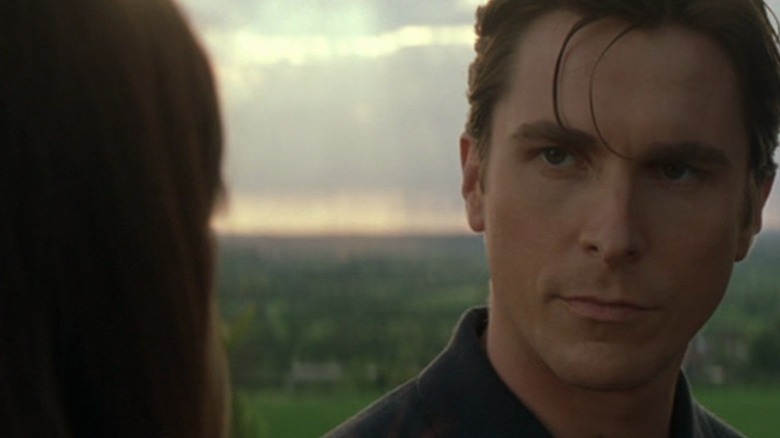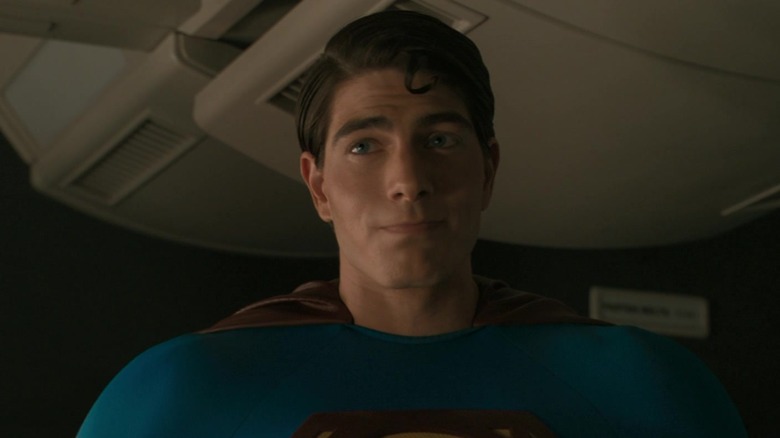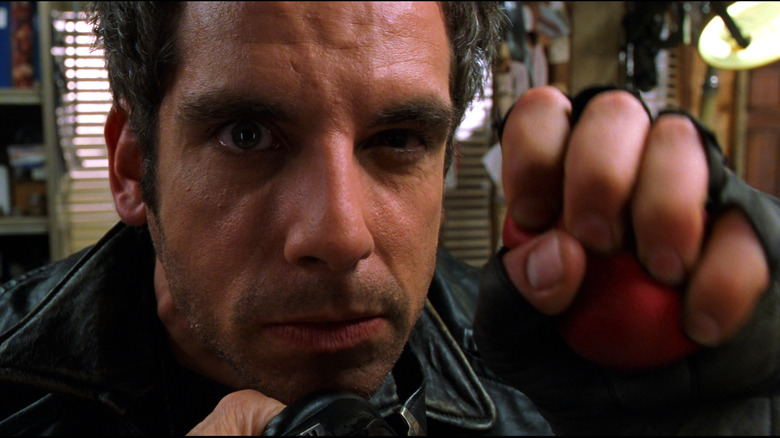Marvel And DC Movies Have Been Feeding Millennials Terrible Romantic Male Role Models
Looking back, even with the loving, nostalgia-jaundiced eyes of a rapidly decaying millennial, the mid-90s to late-2000s era of superhero media was an age of pop culture growing pains – not to be confused with the era of 1985 to 1992, which was the age of the actual pop culture "Growing Pains." That's not important. Let's start over.
In the before times, back when Kevin Feige was still getting Avi Arad his coffee and angrily scribbling notes in his wish journal about when dance scenes are and aren't appropriate, superhero movies were a rare and beautiful commodity to a specific class of nerd. It's not a poppin' fresh take to call them the fables and myths of the modern day, dosing audiences with morality lessons cut with liberal amounts of explosions and punching in a "spoonful of sugar" kind of way. Spider-Man taught us that with great power comes great responsibility. Superman taught us how hard it is to make a live-action Superman movie. Batman taught us that you can get over anything if you do enough push-ups.
And with the benefit of hindsight, astonishingly few of them instructed young men on how to not be giant creeps. And no, it's not every screenwriter's job to mentor an audience of millions. Movies would be boring if the heroes were good at everything, and relationship drama isn't just relatable, it's also way easier to shoot than, say, a car getting thrown at a guy. Still, looking back on the way that our heroes were shown dealing with the people they claimed to love more than anything else in the world, it's hard not to see a pattern of mildly upsetting, thoroughly unenviable dickishness.
Spider-Men need to get it together
We begin with the easy answer, in the fields of both dumpster boyfriend behavior and undeniable merchandise potential: Spider-Man, widely purported to do whatever a spider can. In his first foray as a mildly-jacked Tobey Maguire, he is a creep, the kind that hangs out on the periphery with a camera while his best friend dates a girl he likes, waiting for things to go wrong. When this happens in other movies, it ends with Rick Grimes holding a bunch of posterboard and doing light makeouts with his friend's wife in the middle of the street. Here, it concludes with the friend getting exploded and stabbed and brain-damaged and killed, and with Peter slow dancing with the girl that he likes as his way of saying "I'm sorry I hit you that time when you asked me to stop hitting people."
But then, a new day dawns, and a new Spider-Man appears, this time in the form of Andrew Garfield's hairline and also the rest of him. This iteration of the wall crawler is deep into a behavior that we'll see a lot of moving forward: Gingerly stalking his romantic quarry from the shadows as if to say "(rattling mouth-breathing noise.)" Another classic superhero romance move comes up around his second film, when our boy plays catch-and-release with Gwen's affections just because he's haunted by visions of her father's dying wish that Peter maybe should go kiss other people's daughters for a while. If you're a young person reading this and you take one lesson from today, let it be this: If you're having hallucinations of Denis Leary telling you to not date Emma Stone, don't hide that from your partner and then disappear for unclear reasons. Tell them about it, and they'll break up with you. It's so much easier.
Batman begins to fly red flags
So you've got this buddy from when you were a kid and you used to get into all sorts of rabble rousing together, drinking condensed milk and falling down wells and so on. Kid stuff. It's cute.
Then his parents get shot and he gets ... oof. He gets intense. Not like "nurses a scotch and stares furrow-browed at the fireplace every night" intense. More like "brings a handgun to a courtroom so he can kill a guy" intense.
So then you slap him a little bit and he leaves for a while to learn how to do swords good on ice, and the next thing you know, he's back, and he's ready for kissing, and that slap thing you did must have had a real impact because he's pretty staunchly anti-gun now. The only thing is that he keeps showing up places with a nameless woman on each arm and then promising you that it's cool, this isn't really what he's like, he's really all about (mumble mumble). Around this time, another guy starts following you to the L train at night and punching you a path home. Later, the punching guy very pointedly quotes back some stuff that you said to the first guy about how actions speak louder than words and makes you feel like a jerk, basically saying, "It's your fault for not assuming that I was making the world a better place with my punches in between high-profile rich boy shenanigans."
Anyway, for some reason you kind of feel too intimidated to tell this guy "I would like to only kiss my boyfriend moving forward" in person, so you turn into Maggie Gyllenhaal, leave a sternly-worded note with his butler, ask him to pass it on, and then explode instead.
Superman Returns, despite the restraining order
In 2006, Bryan Singer (strike one) tried to remind audiences that they used to believe a man could fly. More specifically, he tried to remind them that a man could fly just outside your window at night and listen while you talked to your boyfriend about him. For some reason, the longer version of that log line never stuck.
The creepiness inherent in "Superman Returns" isn't a matter of debate. Even with the best intentions and a heartwarming score, there's just no way to frame super-stalking as anything other than altogether ooky. In the long term, there are some pretty spectacular questions to be asked about the morality of leaving an ex to raise a kid that she might not even remember conceiving thanks to complicated canon involving memory-erase kisses and a laissez faire approach to which sequels do and don't count. Taking an even wider view of things, it's never a great sign when your partner keeps leaving unexpectedly to go hang out with Kevin Spacey. With the time and space allotted here, it will have to suffice to say that your ex-girlfriend's house needs to be a zone where no X-ray vision or super hearing is permitted. On a more personal note, if you find out that your ex is dating James Marsden? Leave them alone. Do you know how rare that is? Good for them.
Honorable mention: Mister Furious, Role Model
There's no subtle way to say it. "Mystery Men" is the gift that keeps on giving. It's a microcosm of the peculiarity of superhero aesthetics in a post-Schumacher world, combining surreal neo-gothic architecture with disco-themed supervillains. It is a treasure, and in a hodgepodge of unusual characters, Ben Stiller gives viewers what might be the closest thing to ... well, if not a healthy role model for romantic relationships, at least one who's doing his best.
Stiller's Mister Furious is a try-hard, always-negging never-was who doesn't understand why Monica, the waitress he likes (Claire Forlani) isn't interested in his Harley (compatible) motorcycle. He talks like the panels of a first-draft Wolverine solo comic written by a seventh-grade boy who tried his first beer over the summer and won't stop bringing it up.
Then, and this is wild, the same thing happens to Furious that happens to most people who act like that: Everyone tires of him. In his lowest moment, he's faced with the harsh reality that angst doesn't get you very far with the sorts of people you want to spend time with. With work and patience, he admits that he doesn't want to walk Monica home because of the ever-present threat of super crime, he wants to do it because it would be nice to be around her. He even owns up to the fact that he doesn't have an awesome secret identity, he's just a guy named Roy, and in a moment that's nicer than it has any right to be (considering this movie is 20% fart jokes), he realizes it's okay to just be Roy.
Fine, it's not perfect, but at least he doesn't hover outside of her house while she makes HelloFresh with her boyfriend.
